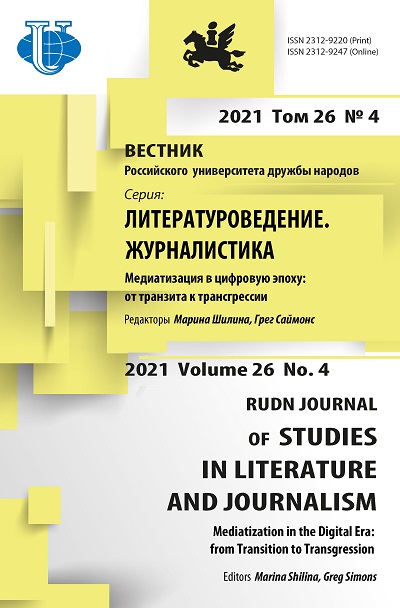The Motive of Peace in the Works of B. Pasternak and M. Bulgakov
- Authors: Fei L.1, Rudenko M.S.2
-
Affiliations:
- Hankai University
- Lomonosov Moscow State University
- Issue: Vol 26, No 4 (2021): MEDIATIZATION IN THE DIGITAL ERA: FROM TRANSITION TO TRANSGRESSION
- Pages: 761-770
- Section: LITERARY CRITICISM
- URL: https://journals.rudn.ru/literary-criticism/article/view/29869
- DOI: https://doi.org/10.22363/2312-9220-2021-26-4-761-770
- ID: 29869
Cite item
Full Text
Abstract
The concept of “peace” entered into Russian culture from the Bible and became its important spiritual tradition. With the development of secular literature, “peace” has gradually come out of the sacred field and become the significant aesthetic concept rich in connotation. In their works, Pasternak and Bulgakov reflect on the “peace” in the field of existence and art, especially the ontological value of family and love, thoughts about history, death and creativity. The concept of memory plays an important role in the artistic world of the two writers. Bulgakov’s and Pasternak’s books are testimony to rebirth and immortality, which is the way they participate in the sacred cause. The paper analyzes the place and role of the motive of peace in the novels of B. Pasternak Doctor Zhivago and M. Bulgakov The Master and Margarita in their similarities and differences. In this regard, the images of the house, music, creativity as the focus of the artist’s world are compared, the typological related figures of the beloved muse and the savior are considered, the specificity of the disclosure of the theme of immortality in creativity is noted.
Keywords
About the authors
Li Fei
Hankai University
Author for correspondence.
Email: LIFEI2017@yandex.ru
ORCID iD: 0000-0002-4788-5294
doctoral student
Weijin Rd, 94, Тяньцзинь, 300071, ChinaMaria S. Rudenko
Lomonosov Moscow State University
Email: liza_rudenko_1996@mail.ru
Senior Teacher, Ph.D. Candidate of Faculty of Philology
1 Lenin Mountains, bldg 51, Moscow, 119991, Russian FederationReferences
- Wang, Zhigen. (2013). Thoughts on foolishness — a cultural interpretation of Russian literary classics. Beijing: Peking University Press. [王志耕,《圣愚之维:俄罗斯文学经典的一种文化阐释》,北京:北京大学出版社,2013年。]
- Deacon Andrey Kuraev. The Master and Margarita — for Christ or against? “He deserves peace”. Retriеved September 12, 2021, from http://bulgakov.lit-info.ru/bulgakov/kritika/ kuraev-za-hrista-ili-protist/on-zasluzhil-pokoi.htm. (In Russ.)
- Ivanova, N.B. (2019). Bulgakov and Pasternak. Accuracy of secrets. In M.A. Bulgakov, Pro et contra. Saint Petersburg: Publishing house of the Russian Christian Humanitarian Academic. (In Russ.)
- Kotelnikov, V.A. (1994). “Peace” in religious-philosophical and artistic contexts. In Russian literature, (1), 3–41. (In Russ.)
- Loshchits, Yu.M. (1986). Goncharov. Moscow: Young Guard. (In Russ.)
- Pasternak, B.L. (2004). Complete Work. Vol. III. Prose. Moscow: SLOVO, 2004.
- Prishvin, M.M. (1969). Forget-me-nots. Moscow: Fiction. (In Russ.)
- Smirnov, I.P. (1996). Novel of secrets “Doctor Zhivago”. Moscow: NLO. (In Russ.)
- Halizev, V.E. (2004). Literature Theory. Moscow: Higher School. (In Russ.)
- Chudakova, M.O. (1986). “And books, books..” In They fed my muse: Books in the life and work of writers. Moscow: Book. (In Russ.)
- Yablokov, E.A. (2001). Artistic world of Mikhail Bulgakov. Moscow: Languages of Slavic culture. (In Russ.)
Supplementary files















